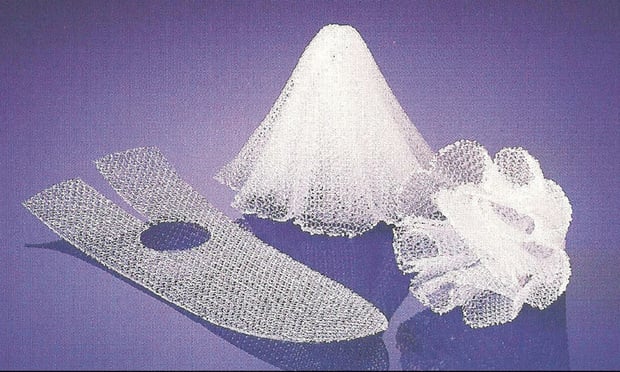Phila. Judge Stands by $41M Pelvic Mesh Verdict and His Refusal to Recuse
Judge Kenneth Powell filed an opinion earlier this week contending that defendant Ethicon's numerous issues on appeal are "meritless," and asking the appellate court to affirm the verdict in Emmet v. Ethicon.
August 23, 2019 at 05:21 PM
4 minute read
 Pelvic mesh.
Pelvic mesh.
The Philadelphia judge who oversaw the pelvic mesh trial that resulted in a $41 million win for the plaintiff in January has urged the Pennsylvania Superior Court to uphold the verdict and find that he properly denied defendants' request that he recuse himself from the case.
Judge Kenneth Powell filed an opinion earlier this week contending that defendant Ethicon's numerous issues on appeal are "meritless," and asking the appellate court to affirm the verdict in Emmet v. Ethicon. The verdict included $15 million in compensatory damages and $25 million in punitive damages, as well as $1 million on a loss of consortium claim.
The 34-page opinion also outlined Powell's reasoning for rejecting Ethicon's efforts to have him removed from handling pelvic mesh cases, characterizing the company's efforts as attempts to "judge-shop."
"Here, Ethicon has repeatedly attempted to seek recusal of the undersigned in an attempt to 'judge-shop,'" Powell said in the opinion, which was docketed with the court Wednesday.
Ethicon, which is a subsidiary of Johnson & Johnson, had made repeated requests that Powell be barred from handling pelvic mesh trials because his mother was pursuing a lawsuit against another J&J subsidiary over the blood thinner Xarelto. In March, supervising Judge Arnold New entered an order denying those requests.
In his recent opinion, Powell cited transcripts of his in-court explanation, in which he stated that, despite an allegedly misleading media report, his mother never sued Ethicon, but only the makers of Xarelto—a litigation he said he has not handled and is not familiar with. Powell also noted that he contacted New when he first learned of his mother's lawsuit.
Powell further said the reason Ethicon wants him off the litigation is because they are unhappy with his ruling to allow in evidence of the premarket approval process with the U.S. Food and Drug Administration, known as the 510(k) process.
"Defendants are unhappy with this ruling. As such, they have tried to pursue any avenue of appellate review possible—even filing a King's Bench motion (denied per curiam) in the most recent pelvic mesh case in front of this court, McFarland v. Ethicon—to obtain recusal of the undersigned," Powell said.
However, Powell said that the evidence is clearly admissible under the U.S. Supreme Court's 1996 case Medtronic v. Lohr.
"Ethicon chooses to ignore case law from the Supreme Court of the United States simply because it is not favorable to their claim," he said. "For all of the above reasons, this claim is meritless."
A statement by Kline & Specter attorneys Thomas Kline, who was lead trial counsel, and Charles "Chip" Becker said, "We are pleased that Judge Powell addressed each and every one of the stream of meritless allegations of error, which has been the consistent, predictable post-trial tactic by Johnson & Johnson following each of the nine jury verdicts where their mesh device products have been found defective by Pennsylvania juries."
A spokeswoman for Ethicon declined to comment.
According to Kline, the plaintiff, Suzanne Emmet, who is in her late 50s, had three pelvic mesh devices implanted after she suffered organ prolapse. The mesh, however, ended up repeatedly eroding into her vagina, leaving her with urinary incontinence, painful bladder contractions and pain during sex, Kline said. According to Kline, she underwent nine surgical procedures and underwent more than 40 nerve treatments, including injections. Kline also said the husband's loss of consortium claim was bolstered by evidence that a piece of mesh, "like a piece of barbed wire," cut Michael Emmett's penis during sex.
This content has been archived. It is available through our partners, LexisNexis® and Bloomberg Law.
To view this content, please continue to their sites.
Not a Lexis Subscriber?
Subscribe Now
Not a Bloomberg Law Subscriber?
Subscribe Now
NOT FOR REPRINT
© 2025 ALM Global, LLC, All Rights Reserved. Request academic re-use from www.copyright.com. All other uses, submit a request to [email protected]. For more information visit Asset & Logo Licensing.
You Might Like
View All
'Discordant Dots': Why Phila. Zantac Judge Rejected Bid for His Recusal
3 minute read
Pittsburgh Jury Tries to Award $22M Against J&J in Talc Case Despite Handing Up Defense Verdict
4 minute read
Plaintiffs Seek Redo of First Trial Over Medical Device Plant's Emissions
4 minute read
Trending Stories
- 1Silk Road Founder Ross Ulbricht Has New York Sentence Pardoned by Trump
- 2Settlement Allows Spouses of U.S. Citizens to Reopen Removal Proceedings
- 3CFPB Resolves Flurry of Enforcement Actions in Biden's Final Week
- 4Judge Orders SoCal Edison to Preserve Evidence Relating to Los Angeles Wildfires
- 5Legal Community Luminaries Honored at New York State Bar Association’s Annual Meeting
Who Got The Work
J. Brugh Lower of Gibbons has entered an appearance for industrial equipment supplier Devco Corporation in a pending trademark infringement lawsuit. The suit, accusing the defendant of selling knock-off Graco products, was filed Dec. 18 in New Jersey District Court by Rivkin Radler on behalf of Graco Inc. and Graco Minnesota. The case, assigned to U.S. District Judge Zahid N. Quraishi, is 3:24-cv-11294, Graco Inc. et al v. Devco Corporation.
Who Got The Work
Rebecca Maller-Stein and Kent A. Yalowitz of Arnold & Porter Kaye Scholer have entered their appearances for Hanaco Venture Capital and its executives, Lior Prosor and David Frankel, in a pending securities lawsuit. The action, filed on Dec. 24 in New York Southern District Court by Zell, Aron & Co. on behalf of Goldeneye Advisors, accuses the defendants of negligently and fraudulently managing the plaintiff's $1 million investment. The case, assigned to U.S. District Judge Vernon S. Broderick, is 1:24-cv-09918, Goldeneye Advisors, LLC v. Hanaco Venture Capital, Ltd. et al.
Who Got The Work
Attorneys from A&O Shearman has stepped in as defense counsel for Toronto-Dominion Bank and other defendants in a pending securities class action. The suit, filed Dec. 11 in New York Southern District Court by Bleichmar Fonti & Auld, accuses the defendants of concealing the bank's 'pervasive' deficiencies in regards to its compliance with the Bank Secrecy Act and the quality of its anti-money laundering controls. The case, assigned to U.S. District Judge Arun Subramanian, is 1:24-cv-09445, Gonzalez v. The Toronto-Dominion Bank et al.
Who Got The Work
Crown Castle International, a Pennsylvania company providing shared communications infrastructure, has turned to Luke D. Wolf of Gordon Rees Scully Mansukhani to fend off a pending breach-of-contract lawsuit. The court action, filed Nov. 25 in Michigan Eastern District Court by Hooper Hathaway PC on behalf of The Town Residences LLC, accuses Crown Castle of failing to transfer approximately $30,000 in utility payments from T-Mobile in breach of a roof-top lease and assignment agreement. The case, assigned to U.S. District Judge Susan K. Declercq, is 2:24-cv-13131, The Town Residences LLC v. T-Mobile US, Inc. et al.
Who Got The Work
Wilfred P. Coronato and Daniel M. Schwartz of McCarter & English have stepped in as defense counsel to Electrolux Home Products Inc. in a pending product liability lawsuit. The court action, filed Nov. 26 in New York Eastern District Court by Poulos Lopiccolo PC and Nagel Rice LLP on behalf of David Stern, alleges that the defendant's refrigerators’ drawers and shelving repeatedly break and fall apart within months after purchase. The case, assigned to U.S. District Judge Joan M. Azrack, is 2:24-cv-08204, Stern v. Electrolux Home Products, Inc.
Featured Firms
Law Offices of Gary Martin Hays & Associates, P.C.
(470) 294-1674
Law Offices of Mark E. Salomone
(857) 444-6468
Smith & Hassler
(713) 739-1250





